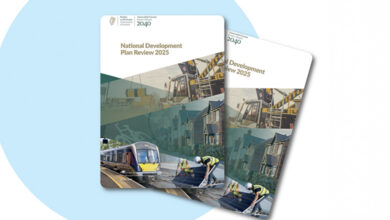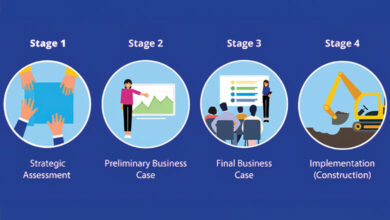CAP23: Annex of Actions

In March 2023, the Government approved specific actions required to implement the targets set out in Climate Action Plan 2023. eolas Magazine outlines the high-level actions indicated from 2023 to 2025 across a range of sectors.
By the end of 2023, the Department of the Environment, Climate and Communications (DECC) intends to publish a long-term climate strategy, alongside a five-year assessment report on climate change, being led by the Environmental Protection Agency (EPA).
These are some of the high-level actions included in the annex of actions in Climate Action Plan 2023, which overarch specific actions outlined for individual sectors.
Alongside a host of actions for research and innovation, which range from a review of the national coordination and governance structures for national environmental research through to a report assessing the optimal investments/pathways
for citizen wishing to reduce energy-related emissions, the plan also details significant governance developments.
Included in governance actions to be taken in 2023 is not only the Department’s development of a monitoring and reporting system to track the Key Performance Indicators (KPIs) set out in the Climate Action Plan, but also the establishment of a range of taskforces, all of which DECC will sit on, with a focus on specific areas or initiatives of climate delivery that requires cross-government collaboration.
Just transition
According to the Annex of Actions, a Just Transition Commission should be in place by the second quarter of 2023, and by the end of the year the sectoral emissions ceiling for the LULUCF sector will be approved by government and in place.
Following approval by the Government of the Public Sector Climate Action Strategy 2023-2025 in March 2023, aimed at delivering at least a 51 per cent reduction in greenhouse gas emissions and a 50 per cent improvement
in public sector energy efficiencies by 2030, other public sector actions include the
development and delivery of the HSE Climate Action and Sustainability Strategy 2022-2050, implementation of Commercial Semi-State Climate Action Framework, and development and delivery of local authority climate action plans.
Some of the key actions for specific sectors are outlined below:
Electricity
- Publish a renewable electricity spatial policy framework (Q3 2023)
- Publish a roadmap for the development and implementation of regional renewable electricity strategies (Q4 2023)
- Prepare new draft wind energy guidelines for onshore renewables (Q4 2023)
- Publish a system-wide plan for the delivery of ORE in Ireland (Q2 2023)
- Publish updated Interconnection Policy (Q2 2023)
- Complete and Publish Electricity Demand Side Strategy and Implementation Plan (Q4 2023)
Industry
- Complete the 2023 Annual Review of the Support Scheme for Renewable Heat (Q4 2023)
- Prepare a decarbonisation roadmap for industrial heat based on the recommendations of the SEAI National Heat Study (Q4 2023)
- Conduct feasibility assessment on carbon capture storage (Q4 2023)
- Publish new Green Public Procurement Strategy and Action Plan (Q3 2023)
Built environment
- Develop and publish a roadmap, under the auspices of the Heat and Built Environment Delivery Taskforce, to phase out fossil fuel heating systems in all buildings (Q4 2023)
- Implement a national awareness and demand generation campaign for residential retrofit (Q4 2023)
- Implement the Energy Efficiency Obligation Scheme (Q1 2023)
- Publish new standards and guidance documents for retrofit (Q4 2023)
- Publish a National Heat Policy Statement (Q3 2023)
- Publish Geothermal Policy Statement (Q2 2023)
Transport
- Convene National Sustainable Mobility Stakeholder Forum (Q2 2023)
- Publish National Demand Management Strategy (Q4 2023)
- Publish a high-powered charging strategy (Q4 2023)
- Publish draft National Policy Framework on Alternative Fuels (Q4 2023)
Agriculture
- Introduce a National Fertiliser Database (Q2 2023)
- Develop a slurry additive to reduce manure methane (Q4 2023)
- Deliver a National Biomethane Strategy
(Q3 2023)
Land use, land-use change, and forestry (LULUCF)
- Develop, assess, and adopt as appropriate the new Forestry Programme 2023-2027 (Q2 2023)
- Launch the CAP Strategic Plan and include a cover crop measure (Q1 2023)
- Commission a review of all peatland restoration work carried out across Ireland by different government agencies, organisations, NGOs and others (Q4 2023)
- Publication of Phase 1 of the Land Use Review (evidential review) and commence Phase 2 (policies, measures and actions) (Q1 2023)
The marine environment
- Establish the new Maritime Area Regulatory Authority (Q2 2023)
- Adopt a statutory Marine Planning Policy Statement and develop Marine Planning Guidelines to support decision making by An Bord Pleanála (Q4 2023)
- Progress at pace the designation of marine Special Areas of Conservation and Special Protection Area sites, prioritised in line with the Government decisions
(Q4 2023) - Progress the mapping of all Irish offshore waters through the INFOMAR Programme (Q4 2023)
- Finalise and launch the new National Marine Research and Innovation Strategy – Ocean Knowledge 2030 (Q4 2023)
The circular economy
- Publish a Whole-of-Government Circular Economy Strategy and promote the circular economy (Q4 2023)
- Establish a Circular Economy Innovation Scheme (Q4 2023)
- Develop and implement a new Regional Waste Management Plans (Q3 2023)
International climate action
Beyond domestic policy, the CAP 2023 annex of actions also includes proposed actions around international climate policy. The plan commits to scale up international climate finance by providing at least €225 million per year in climate finance to developing countries by 2025, monitored through the delivery of annual climate finance reporting to the EU and Ireland’s annual climate finance report.
By Q2 2023, the Department of Foreign Affairs aims to publish the second National Strategy for Ireland’s engagement with small island developing states and says that it hoped to conclude an ambitious legally binding instrument on marine conservation in the high seas under the United Nations Convention on the Law of the Sea.
Adaptation
The Government has identified updating the 2018 National Adaptation Framework as a priority for 2023. By Q3 2022, the Department of the Environment, Climate and Communications aims to publish a draft set of indicators for an existing adaptation sector and a methodology on the use of indicators in national adaptation planning and sectoral guidelines.
CAP 2023 has not changed the target set out in CAP 2021 for 2030, however, it highlights the immense scale of the challenge and the implementation of carbon budget has focused minds on near term action rather than a look out to the end of the decade.
The volume and scale of the actions outlined in the plan for the year ahead are evidence of the complexity of what will be required if Ireland is to reach net zero by 2050. Public sector resources and determination for early implementation will determine how secure the pathway to 2050 is.





